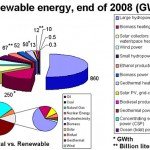Biomass made from organic materials such as animals and plants. The biomass energy are produce by animals and plant wastes, such as wood, sawdust, agricultural wastes, paper and waste from food processing industries.
To evaluate biomass as an alternative energy by looking at the biomass energy pros and cons, you can clearly see the advantages outweigh the disadvantages.
As we use up most of the world’s fossil fuel, biomass energy and other alternative renewable energy will become more common.
Biomass ProsHere is a list of the advantage of biomass | Biomass ConsHere is a list of the disadvantage of biomass |
Biomass is one source of renewable energy that produces biogas, biofuel, heat and electricity from organic wastes. Biomass energy does not require fossil fuel. There are always organic wastes available to produce biomass energy, which make biomass accessible. Some people use biomass to heat their homes and for cooking. Biomass can be produce locally, which help employ local residents, and that mean it is much more cost effective. Since biomass can be produce in the local area, there is no or very little need for long pipelines, wires, and transporting biomass. | Gas such as methane, nitrous oxide and carbon dioxide are release during the biomass creation and when using biomass. The extraction process of biomass is still expensive. Sorting biomass materials is more expensive than other form of energy such as fossil fuels. Need huge space to build a biomass plant and it requires a lot of water for breaking down organic wastes. Biomass has the potential to produce 10 times more energy from the sun or wind, but it still produce toxic gasses that contribute to global warming. Using biomass still need wood, which mean trees will be needed. |
As you can see, there are more pros and advantages by shifting to biomass. This type of renewable energy source greatly outweighs the disadvantage. Biomass is organic wastes that are widely available, with great flexibility and each biomass production can be produce locally, which allows greater customizations for each location to better utilize biomass energy.
All alternative fuels have some sort of drawbacks but we are better off switching from burning coal and fossil fuel.






Thank-you, this was very helpful with my project on Biomass energy.
You claim that there are more pros than cons, but I'm not so sure. A biomass plant is being proposed very close to my house. If you feel so confident about the cons being small, how would you feel about living next to the plant? Want to buy my house — do you think that my house price is about to go up? I don't think so.
i'd like to buy your house lololol. never thought about living next to a plant before, UNLIMITED ENERGY FTW!!!
FAIL
This is really helpful for class thx for helping students everywhere this will help me get an A++++
Awesome
canadas awesome
what kind of website is this
Thanks for the article…..I do not believe that using trees is a biomass con as energy producers will be required to grow more trees than they use ….. that is common sence if you are running a business.
As for living beside a biomass plant this could and I believe would result in higher real estate value compared to other energy producing surronding property such as nuclear …what seems to be the problem ?
Thank you for allowing me to share my thoughts.
After all if you were rich which one would you want in your back yard ?